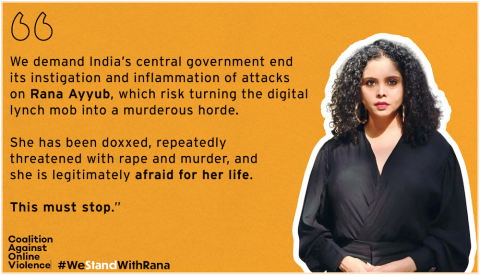
Credible threats against Washington Post columnist Rana Ayyub, in a context of prolific online violence and increasing legal harassment by the Indian government, have triggered 15 international civil society organizations to unite in her defense.
The Coalition Against Online Violence (CAOV), has issued an alert about the high-profile independent investigative reporter based in Mumbai, India, who’s been the target of a sustained and crude intimidation campaign designed to silence her. The attacks have escalated badly in recent weeks, with a combination of legal threats and brutal online abuse creating a high risk situation which threatens to morph into physical violence.
“We demand India’s central government end its instigation and inflammation of attacks on Ayyub, which risk turning the digital lynch mob into a murderous horde,” COAV says. “She has been doxxed, repeatedly threatened with rape and murder, and she is legitimately afraid for her life. This must stop.”
On Feb. 10 Mumbai police arrested and detained a man in connection with death threats sent to Ayyub via social media in connection with her journalism. This follows charges brought against six social media users in connection with death threats, sexual harassment, and identify theft.
The objective is to chill Ayyub’s critical reporting on the Modi government, and the right wing Bharatiya Janata Party (BJP) more broadly. But the journalist will not be silenced. She is still filing stories to the Washington Post and speaking truth to power, even as the threats to her life and her freedom escalate amid legal persecution.
At the same time, she is facing economic abuse. The multi award-winning journalist’s bank accounts were frozen again last week — for the second time in six months — by Indian authorities pursuing retaliatory tax and foreign investment-related cases against her. This has resulted in her being unable to access her earnings or other financial resources.
In January, Ayyub wrote in the Washington Post about the tens of thousands of abusive social media threats she was enduring as her name trended on Twitter in connection with the attacks, which she said mostly came from users identifying as right-wing Indians or Saudi nationalists. Since then, the threats have continued, with threatening behavior reported on the street outside her home. The latest escalation in attacks on Ayyub follows years of harassment and abuse against the journalist - both online and offline.
CAOV echoes calls for news publishers, civil society organizations and the diplomatic community to vigorously defend her right to practice journalism freely and safely in India.
Signatories: Article 19, Coalition For Women in Journalism, Committee to Protect Journalists, Free Press Unlimited, Geena Davis Institute on Gender in Media, International Center for Journalists, International Press Institute, International Women’s Media Foundation, OnlineSOS, PEN America, Reporters Without Borders, Rural Digital Youth Resiliency Project, Stop Online Violence Against Women, Vita Activa, Women’s Media Center
Media contacts:
Julie Posetti, International Center for Journalists, jposetti@icfj.org
Elisa Lees Munoz, International Women’s Media Foundation, emunoz@iwmf.org
Editor's note: This statement was updated on February 24 to include three additional organizations: Geena Davis Institute on Gender in Media, Stop Online Violence Against Women and Vita Activa.